Stepping out of the crisp, cool winter air and into a high tunnel, you’re greeted with a blanket of warm, humid air that envelops the winter produce that’s growing inside. The vibrancy of the produce is shocking. Deep, dark purples and robust, hardy green vegetables grow among the pure-white snow drifts that cover the fields of Fifth Month Farm.
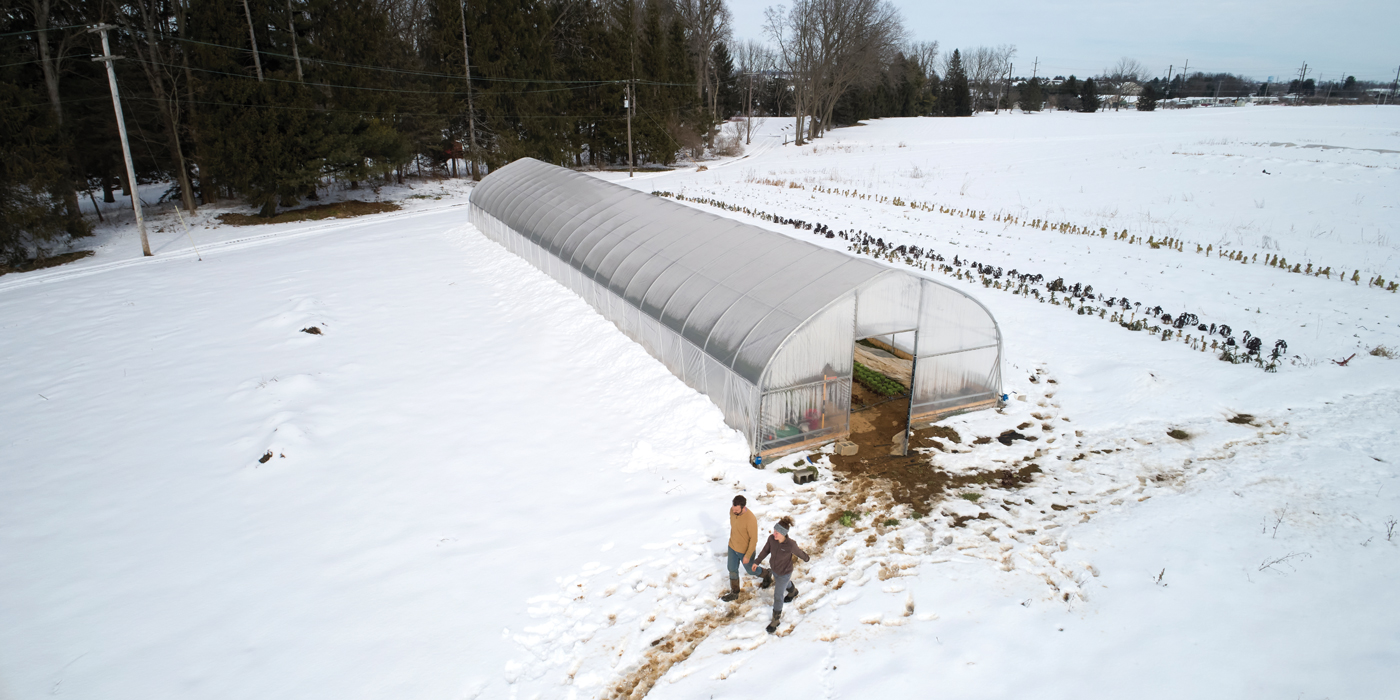
Devin and Kristi Barto, owners of Fifth Month Farm in Mount Joy, walk through the snow after leaving their high-tunnel hoop house in which they grow an assortment of lettuces, frisée, arugula and spinach during the cold-weather months.
With the temperature standing at 45 degrees, today is a warm day for early February, which allows the door to the high tunnel to be open in order to circulate cooler, drier air. Condensation gently rains down the transparent plastic walls, imparting the soft sound of a slow patter that precedes a heavy storm. Located in Mount Joy, along a picturesque country road, the wintry scene at Fifth Month Farm is nothing short of bucolic.
Fifth Month Farm takes its name from the shared birth month of owners Kristi and Devin Barto, whose energy and fervor for growing food is contagious. Devin grew up in Manheim and has farmed organically for over 14 years. Like many folks I meet from Lancaster County’s food community, Devin lived in other areas – including Maryland and Philadelphia – before he returned home with new ideas. Kristi describes herself as a “fine artist, baker and plant caretaker,” but her farming skillset is robust. The two found the opportunity to pursue a dream by leasing five acres of farmland in Mount Joy from one of Devin’s childhood friends.
Think You Know a Carrot
As the Bartos have proved, not only is growing food during the winter months possible but the flavor and characteristics it yields are arguably better. For example, you think you know what a carrot should taste like but until you’ve bitten into one that’s overwintered, you’ll think otherwise. In a process similar to melting ice with salt in the winter, vegetables change their chemistry in the cold in order to keep their cells from freezing. This process occurs with carrots, radishes, kale and spinach to name only a few.
When the temperature drops, such plants convert starches into dissolved sugars in an effort to lower the point at which they freeze and therefore, survive the frost. With less starch and more sugar, this natural resistance to freezing concentrates and sweetens the flavor. In the case of a carrot, its flavor becomes bright and citric, almost like that of an orange or lemon. For that same reason, I much prefer winter spinach and arugula over varieties that are grown in the summer. Winter-grown varieties simply deliver a sweeter and less-bitter flavor.
To make the farm prosper in winter, planting and harvest must be carefully timed with the arrival of frigid weather. To do so, Devin and Kristi employ organic practices inspired by northern European and northern Asian farming techniques that continue to evolve. Carrots stay warmer under a bed of straw, while spinach can endure some frost under tunnels that consist of small hoops covered in fabric and are low to the ground. Salad greens grow nicely in high tunnels or greenhouses.
As one might expect, winter farming is rife with challenges. “The weather is the obvious reason it’s difficult to farm in the winter,” says Kristi. “We have to figure out how to harvest in a very different set of circumstances than at any other time of the year. You don’t have as much daylight. Everything you do, you move slower because you’re wearing more clothing. We can’t just get here at 7 a.m. and harvest lettuce. It’s still frozen. So to cut it, we would destroy the crop.”
Frustrations are big and small, from planning around the weather forecast to waiting for a frozen garden hose to thaw for cleaning equipment or watering plants, to deep snow that can limit the farm’s rear-wheel-drive van, making loading or unloading more laborious. “Harvesting is difficult,” says Devin. “But I don’t even think about it anymore; you have to know what to do.”
On a windy night, blasts of cold air keep Devin awake more than almost anything else. If temperatures get too low or arrive at the wrong time, frost will damage certain crops, and a strong wind could strip a high or low tunnel frame of its plastic cover, losing heat and all protection from the elements. If you’ve seen the film The Martian, picture Matt Damon’s potato harvest being destroyed by the frigid atmosphere of Mars in a storm, but to a far lesser extreme.
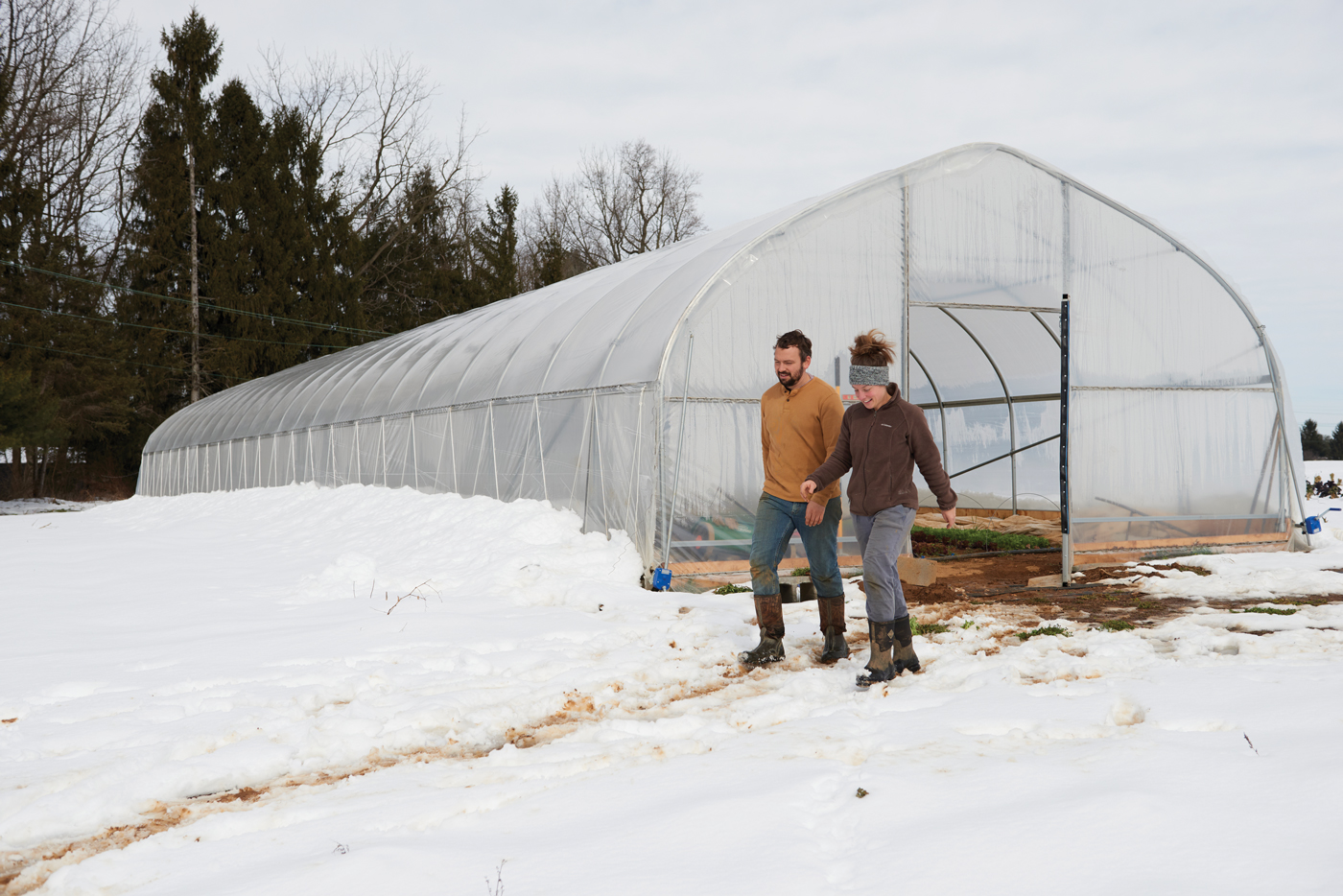
Devin and Kristi dream of owning their own farm someday. For the time being, they are renting acreage in Mount Joy from a friend.
Of course, you can add something totally unexpected to the list of challenges – a pandemic. Last year’s restaurant closures and farmers market cancellations threatened the retail and wholesale aspects of Fifth Month Farm. In search of other ways to complement their winter CSA (community-supported agriculture), the Bartos pivoted to providing customers with an online store and home delivery service.
Winter CSA
This will be my third winter subscribing to Fifth Month Farm’s 14-week CSA. If you’ve never joined a CSA, here’s the gist of how the farm’s winter CSA currently works. When signing up, you buy a “share,” or the number of items you can select each of 14 weeks. I opt for a four-choice share (there are also shares that provide five or six items), so one week’s order might include a bag of arugula, a bundle of leeks, two pounds of fingerling potatoes and one-and-a-half pounds of carrots. Beets, watermelon radishes, Hakurei salad turnips, sweet potatoes and broccolini are other personal favorites. If you’re planning a larger meal one week, a double order of a particular item can be selected, counting as two choices. I’ve found that if we’re going to be busy for a few days, root vegetables, which offer a longer shelf life, are a good choice.
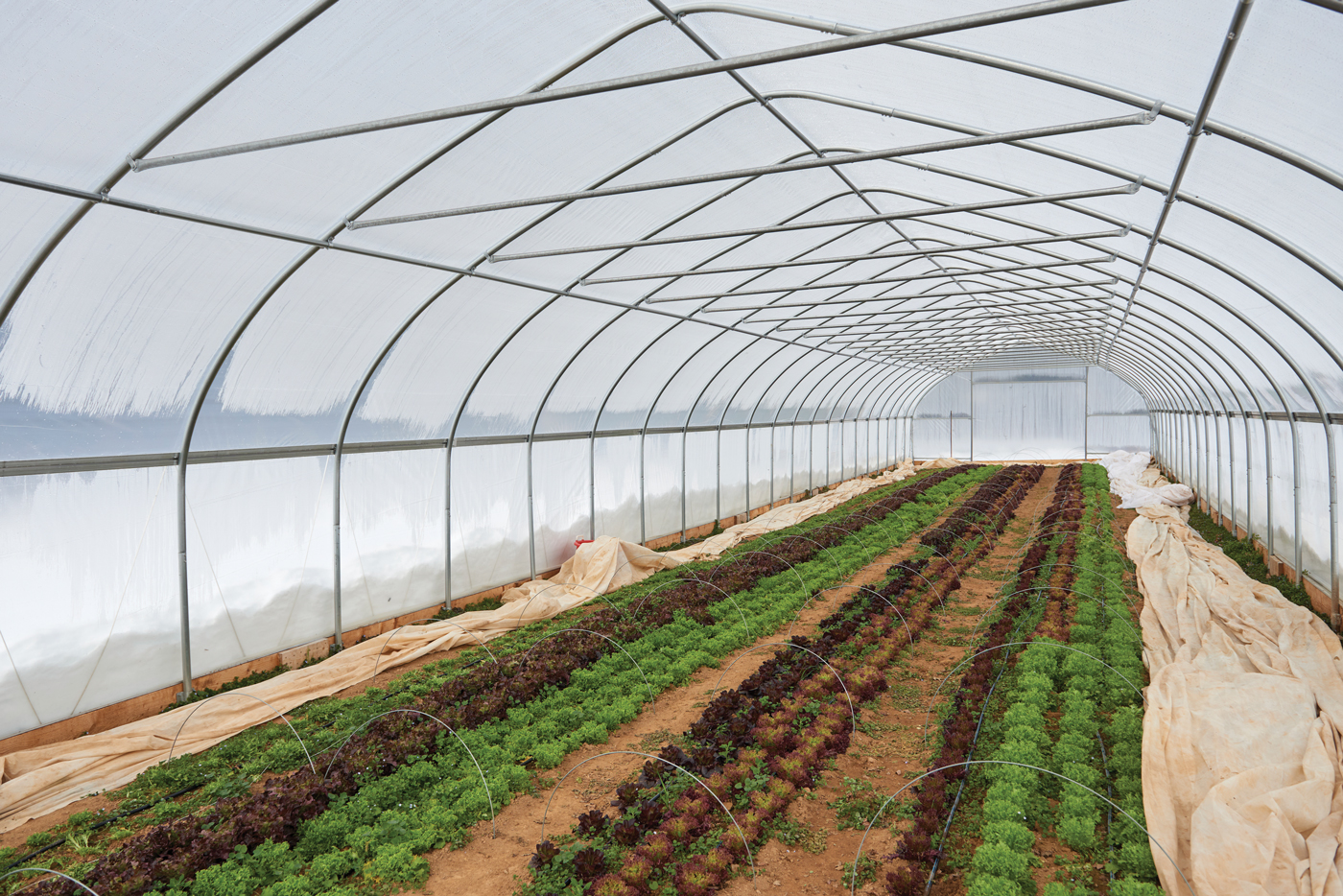
Outside, the exterior walls of the high-tunnel hoop house are lined with snow, while inside the unheated space is vibrant with color. On extra-cold nights, produce can be “tucked in” for added warmth.
Produce choices each week are “market style,” based on what becomes available. CSA members receive an email on Monday morning listing the fresh produce that will be available. Kristi often includes a recipe or dinner ideas to coincide with that week’s selection. Members then have until Wednesday morning to place their orders online. Following harvest, Devin and Kristi neatly package orders by hand on Thursdays. Shares can be picked up by members at a designated location as early as Friday morning. Home delivery is offered for a nominal fee in a designated area of the county, as well.
Granted, some foods such as spaghetti squash are grown in the fall and kept in cold storage, but the attention to detail and freshness are preserved right there on the farm. Tomato purée is another choice that’s occasionally offered. The process begins in the summer months, when Kristi and Devin harvest a few tons of tomatoes. They then load up their van and take the tomatoes to a commercial canner in Berks County, thus capturing the freshness and flavor of summer that can be enjoyed throughout the fall and winter.
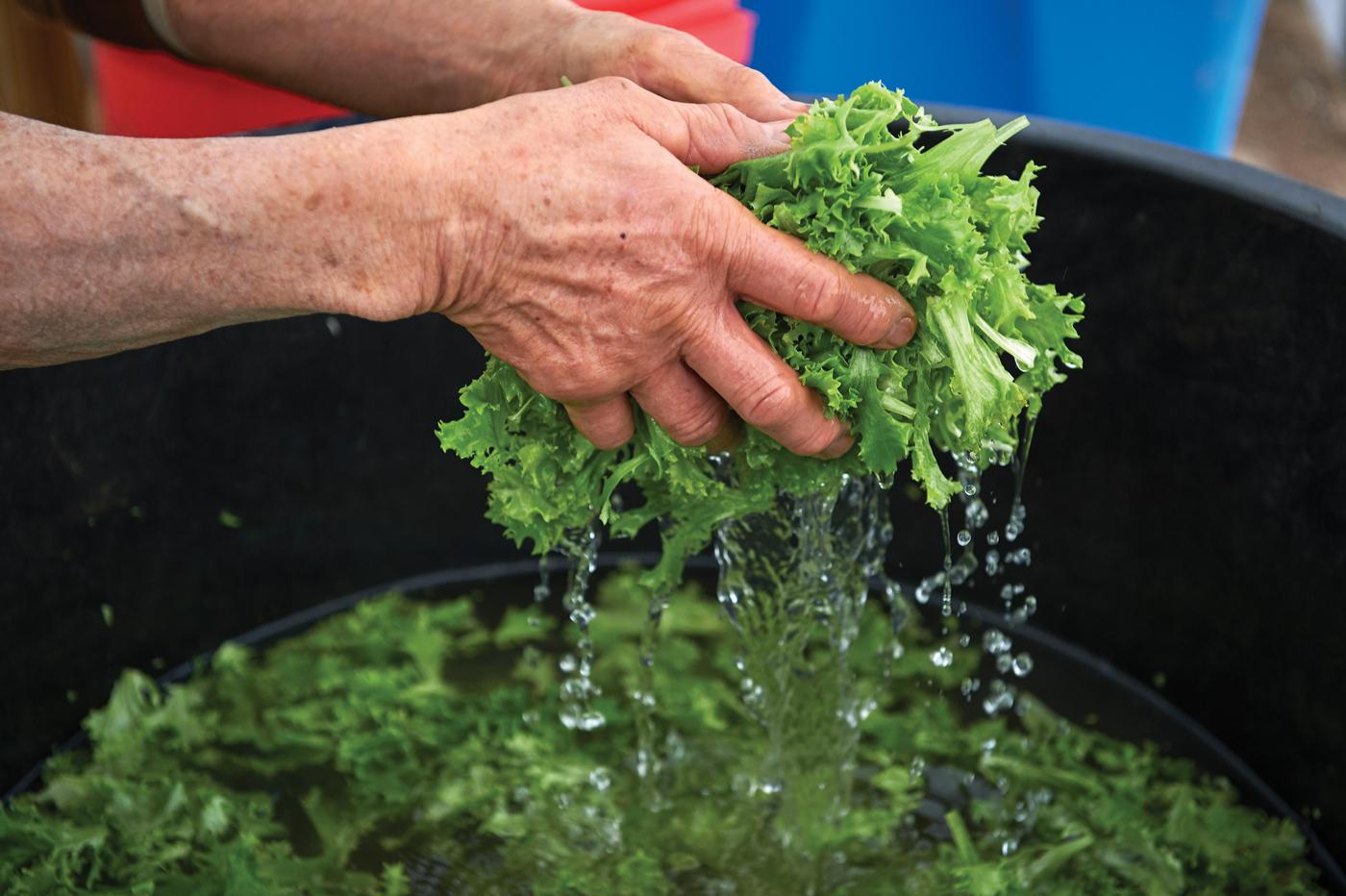
Frisée is washed in ice-cold water during the winter months. The process was originally done by hand but is now carried out with the aid of a mechanical spinner.
Shared Benefits
I’ve found the rewards of joining the CSA to be profound. Because our cold and gray winters are devoid of fresh produce, the temporary absence of our local farm stands always caused sincere longing. Fifth Month Farm’s CSA has changed my mindset. Learning about and experiencing new veggies we otherwise might not have found or endeavored to try, cooking healthy, trying new recipes and embracing new flavors and textures were only the start of making the fall and winter months bearable. The weekly excitement of choosing fresh new produce proved to be striking and unexpected.
Before the CSA kicks off, Devin and Kristi host an event for members to tour the farm on an autumn evening in October. Knowing the people who grow our food and seeing how much care goes into the farm each day of the year, changes how you prepare meals. For us, meal planning has become more intentional and wasting food feels horrific. There’s an origin story attached to those meals, which is great while entertaining guests at dinner. We know we are supporting local farmers such as the Bartos, as well as their staff. The Bartos believe in paying workers a living hourly wage; after all, the labor is physically demanding and skilled, requiring agricultural knowledge.
Because I now have a connection to the place where food grows, I’m often a visitor to the farm. Usually I’m there with a camera in hand, but at this point, I consider Kristi and Devin to be friends. Something Devin once told me as a CSA member resonates and I believe it’s something he would share with any other member: “Our farm belongs to you, too.” Inevitably, it is the support of CSA members that helps the husband-and-wife duo invest in new equipment, such as a produce washer or a heater for a high tunnel to help endure the bitter-cold days of winter. CSA memberships buy seeds that grow into the food that’s enjoyed by so many. Memberships help them plan how to best use their soil and the season by calculating demand and minimizing waste and expenses.

Tatsoi, which is similar to bok choy, is a great substitute for spinach and can be eaten raw or used in a stir-fry.
“Around 50-65% of the members sign up about 10 months in advance,” Devin notes. “That money [enables us to] farm the entire year. Usually, January and February are hard. This year, 50 people signed up for the CSA in January. Having that cash come before we buy our seeds and supplies [enables us] to pay our employees in June and July. That money pays for our mortgage. That’s why we close the [online] store – the CSA members are shareholders of the farm.”
“We close the online store so that we can redirect all of our focus to our winter CSA customers, so they’re getting the best of everything,” says Kristi. “Our CSA requires us to really devote energy to giving really great stuff during a really special time of the year – you often can’t find that from a local farm in our area. They’re the lifeblood,” she says of shareholders. “We’re pretty small and we want to make sure that relationship is special and what they’re buying into is worth what they’re expecting.”
It’s not uncommon for a chef to walk the fields with Devin to see what unique foods are up and coming when planning his or her seasonal menu. According to Kristi, “We will sit down with [seed] catalogs and ask chefs, ‘What did you like last year? What are you looking for this coming year?’ We’re super invigorated by the relationships we’ve been able to develop with local restaurants,” she adds. “I still feel like there aren’t enough restaurants in Lancaster working directly with farmers. It is a real commitment and it’s not always the right fit. I’d like to think there are a lot more of our vegetables that could be utilized by restaurants in Lancaster.”
Kristi and Devin dream of a community where more restaurants and grocery stores source food from local farms – any local farm, not just their own. Food that stays close to where it’s grown travels less (lowering transportation costs), stays fresher (prompting less waste), keeps money in the local economy and supports other small businesses in the community. In addition, unique varieties of food become available.
“The dream is to live a life as farmers that is conducive to having a family and living a relatively normal life,” says Kristi. “We’re more than just farmers. There is a struggle to living a life of farming, especially one where we’re starting from scratch. We didn’t have land but we had resources in the people we know. We owe a lot of our success to other small businesses. As we continue to grow, it becomes really important for us to remain connected to other small businesses.”
The Bartos also look forward to a future where they will own the land they farm. It’s a tall order in Lancaster County, where land is expensive and sought after for a litany of uses, and farmers are exiting perhaps at a greater rate than new farmers are coming up. “I’d like to grow fruit to have apples and pears in the CSA,” says Devin “We’d like to have a certified kitchen to make prepared food to include in the winter CSA.”
Where to Find Them
This year’s CSA is already underway and is sold-out, but sign-ups start soon after the current subscription ends in late January. I’ll warn you, spaces fill up quickly. There’s usually a waiting list at any given time of the year and those commitments help the Bartos plan their seasons with stability. Devin acknowledges that the CSA could continue longer into winter, but offering quality produce consistency with enough quantity for 75 CSA members becomes more difficult as the season progresses. Wanting members to have a great experience from start to finish, “I would rather have the CSA end on a high note,” he says.
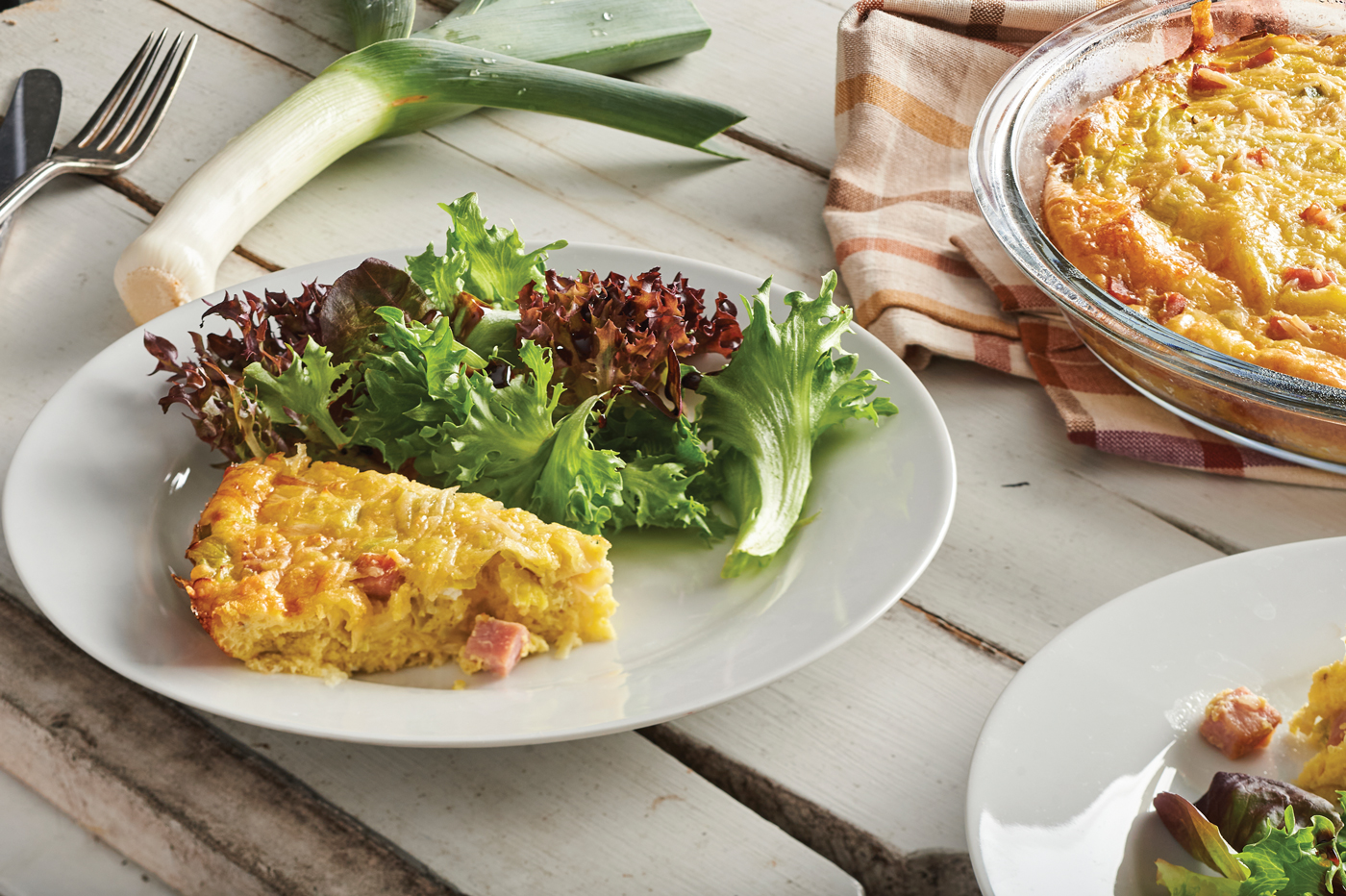
Over-wintered leeks combine with ham, cheese and free-range eggs to create a tasty quiche accompanied by a side of winter salad greens.
• 3 leeks (chopped)
• Ham (diced)
• 1 Tbsp. butter
• 1 Tbsp. olive oil
• 1 cup cheese (Cheddar)
• 1/4 cup heavy whipping cream
• Salt, pepper to taste
Beat the eggs. Trim and chop the leeks, using only the white portion. Sauté the pieces in the butter and olive oil until tender. Combine the ingredients, pour into a greased or non-stick pan and bake at 350 degrees for 30 minutes.
However, at the end of January, when the winter CSA ends, produce is offered to the public through Fifth Month Farm’s online store with a caveat. Updated weekly with the freshest crops, their online store is open for just 24 hours, starting at 8 a.m. every Tuesday and closing at 8 a.m. on Wednesday, with deliveries made every Friday. In addition, their produce is stocked at Lemon Street Market and is included on local restaurant menus. You can also help to support local farmers by asking your favorite restaurant if any of their food suppliers are local farms.
For more information, visit fifthmonthfarm.com.

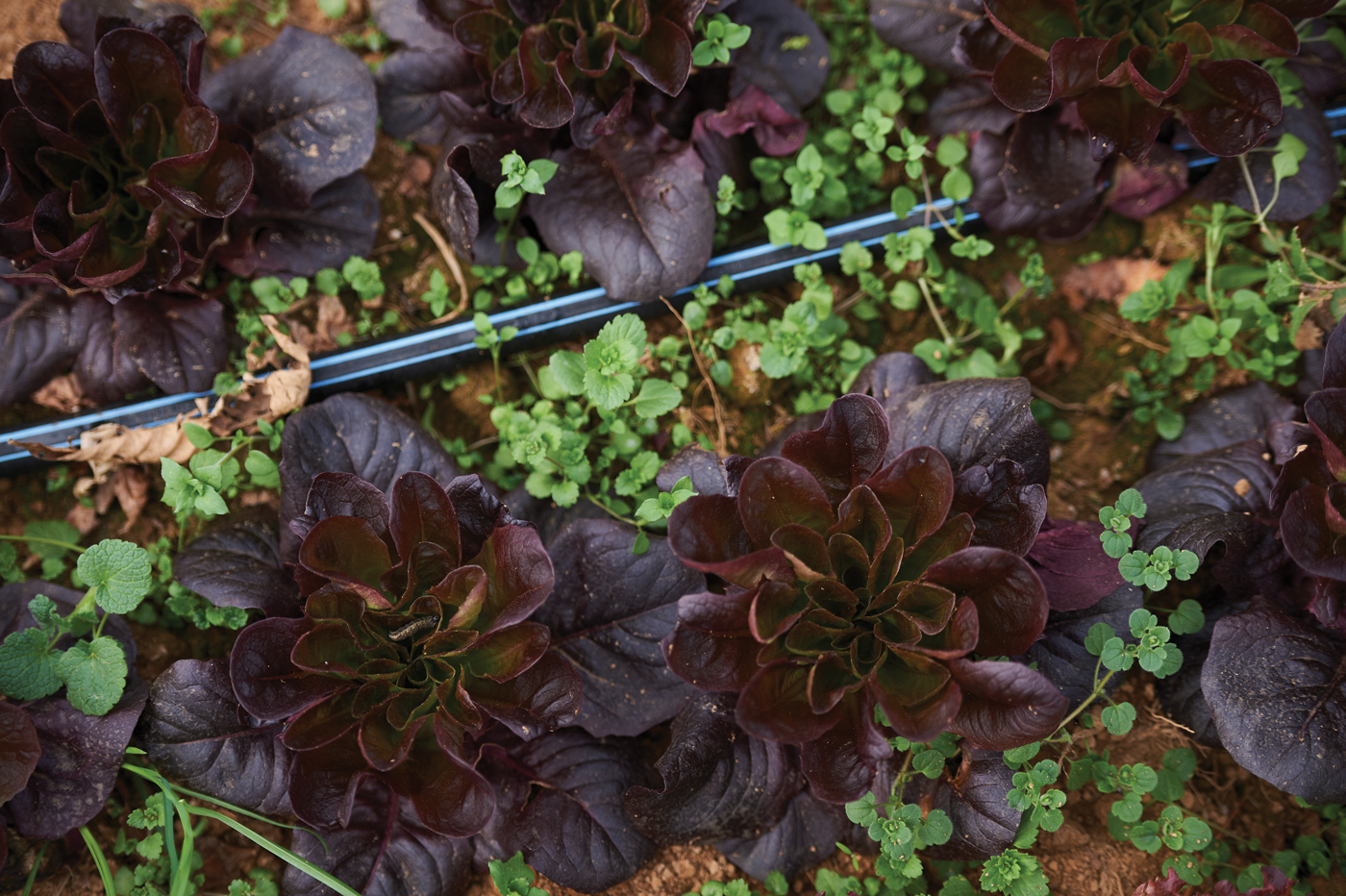
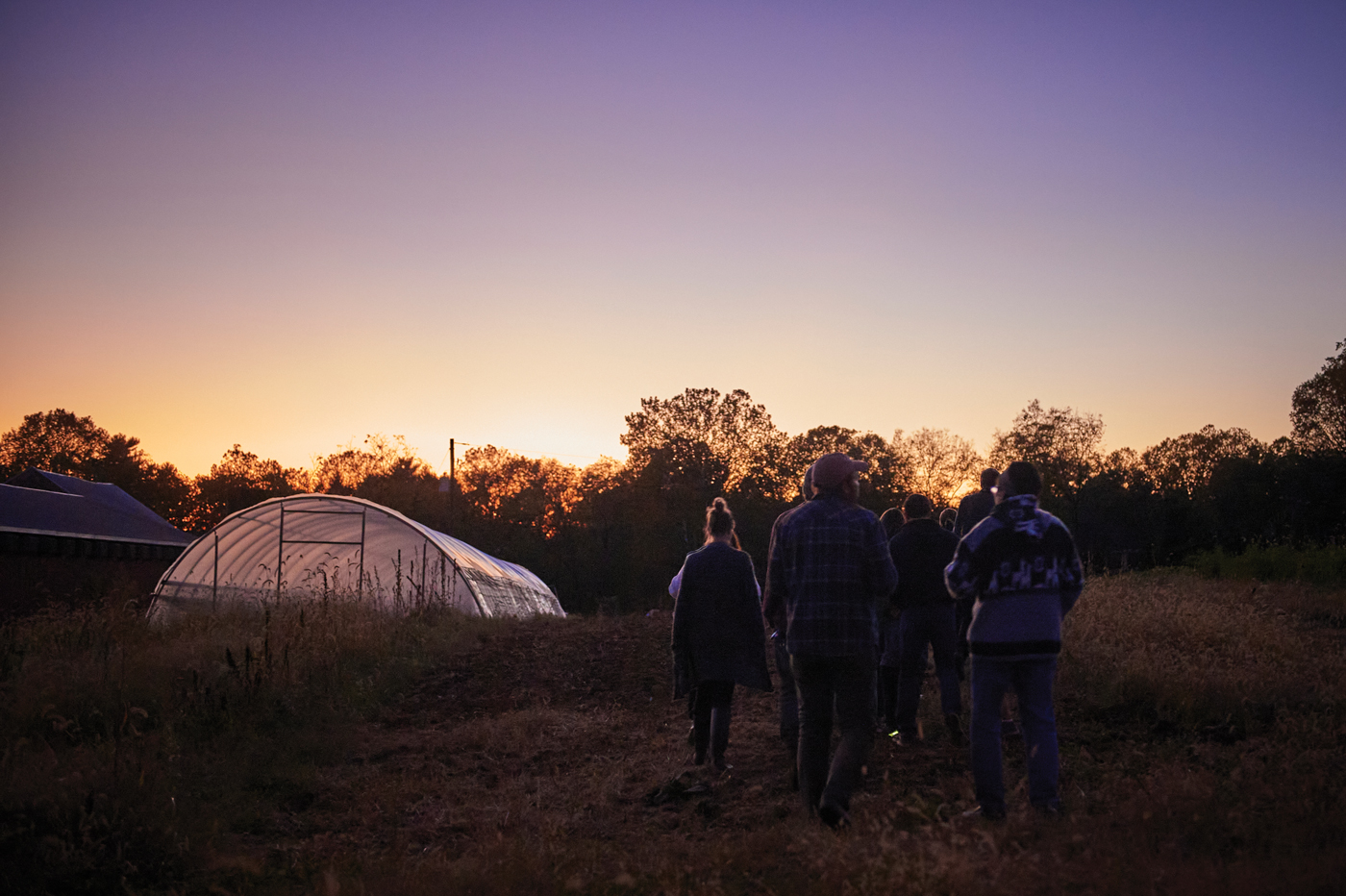
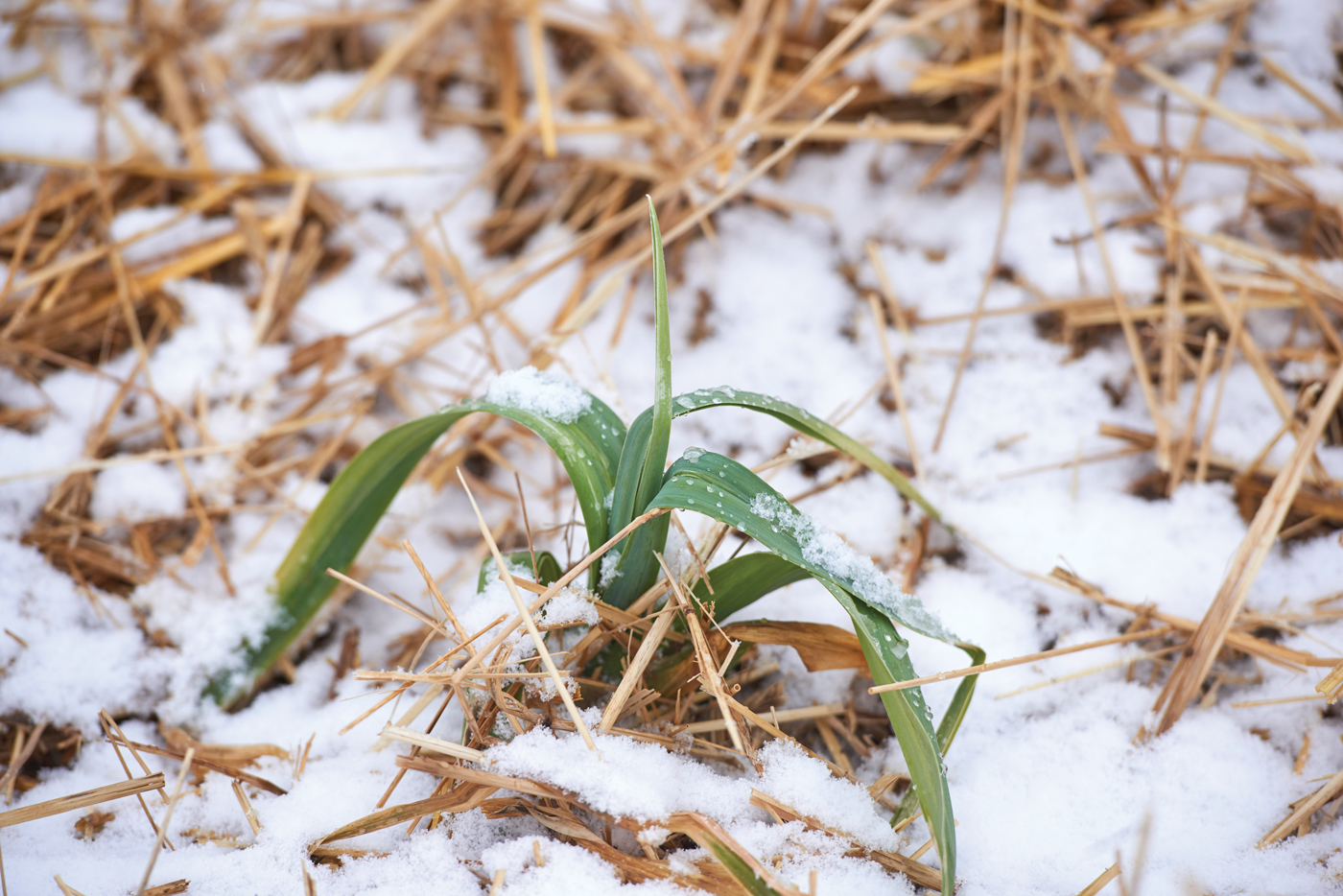
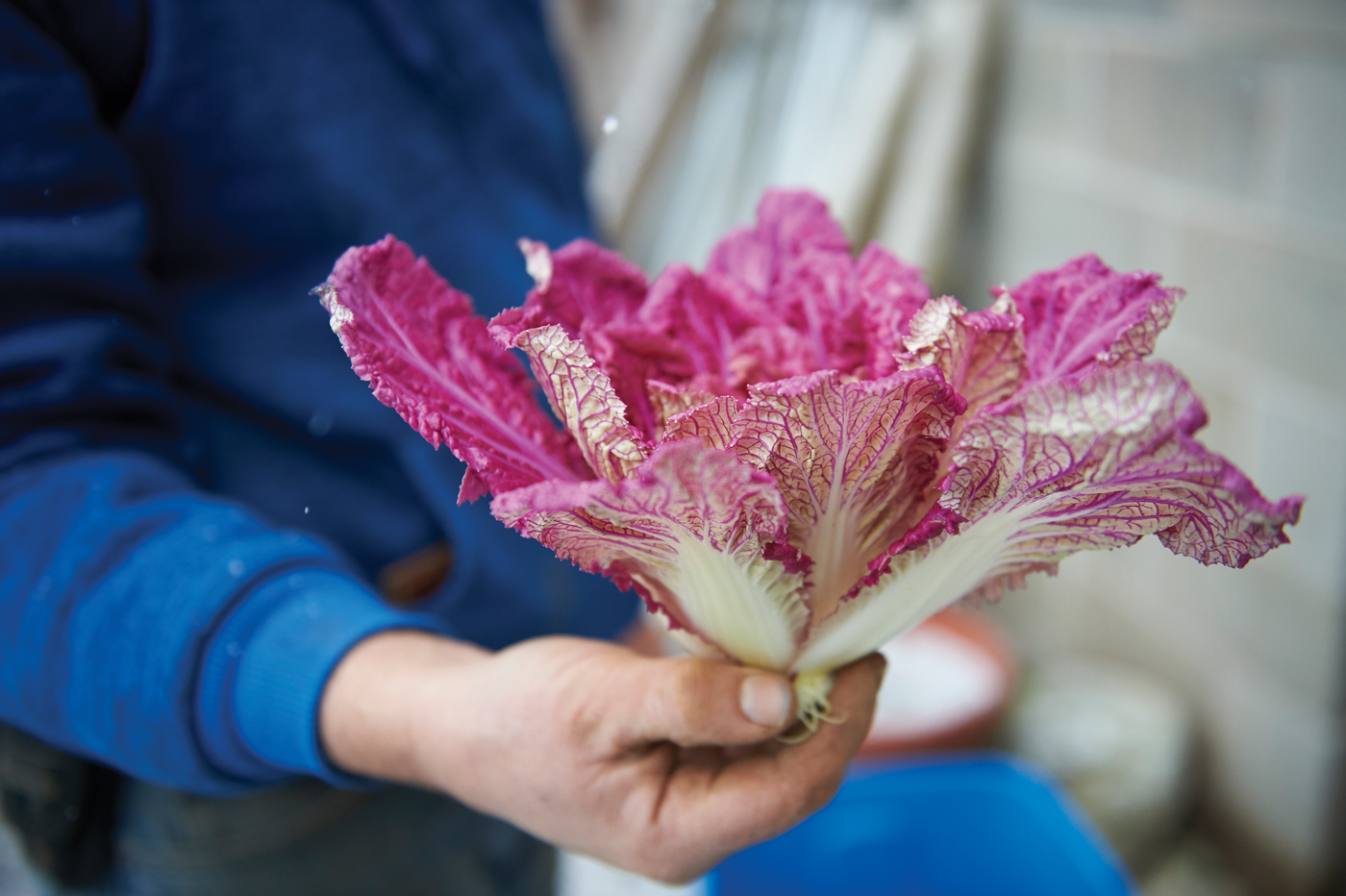
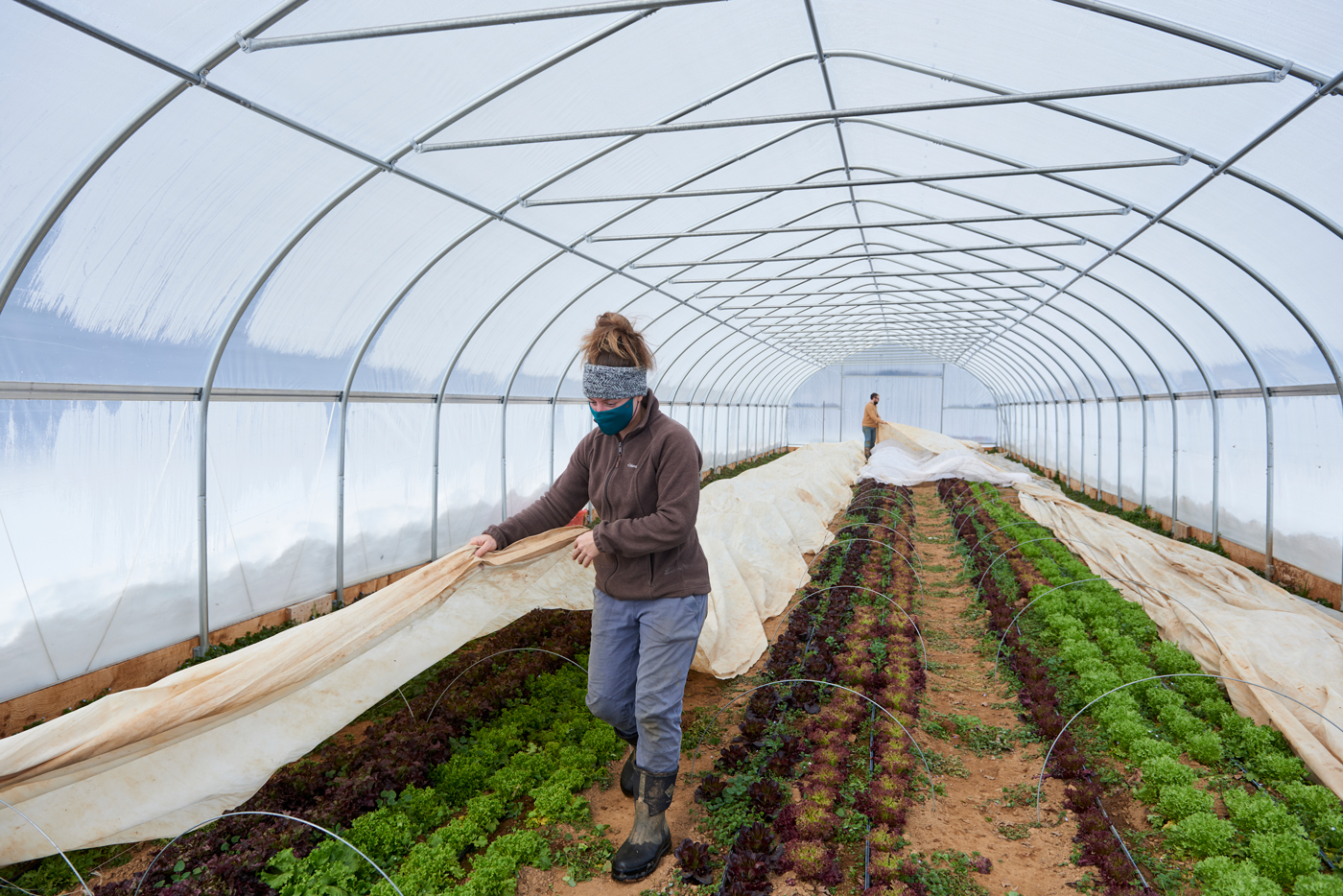
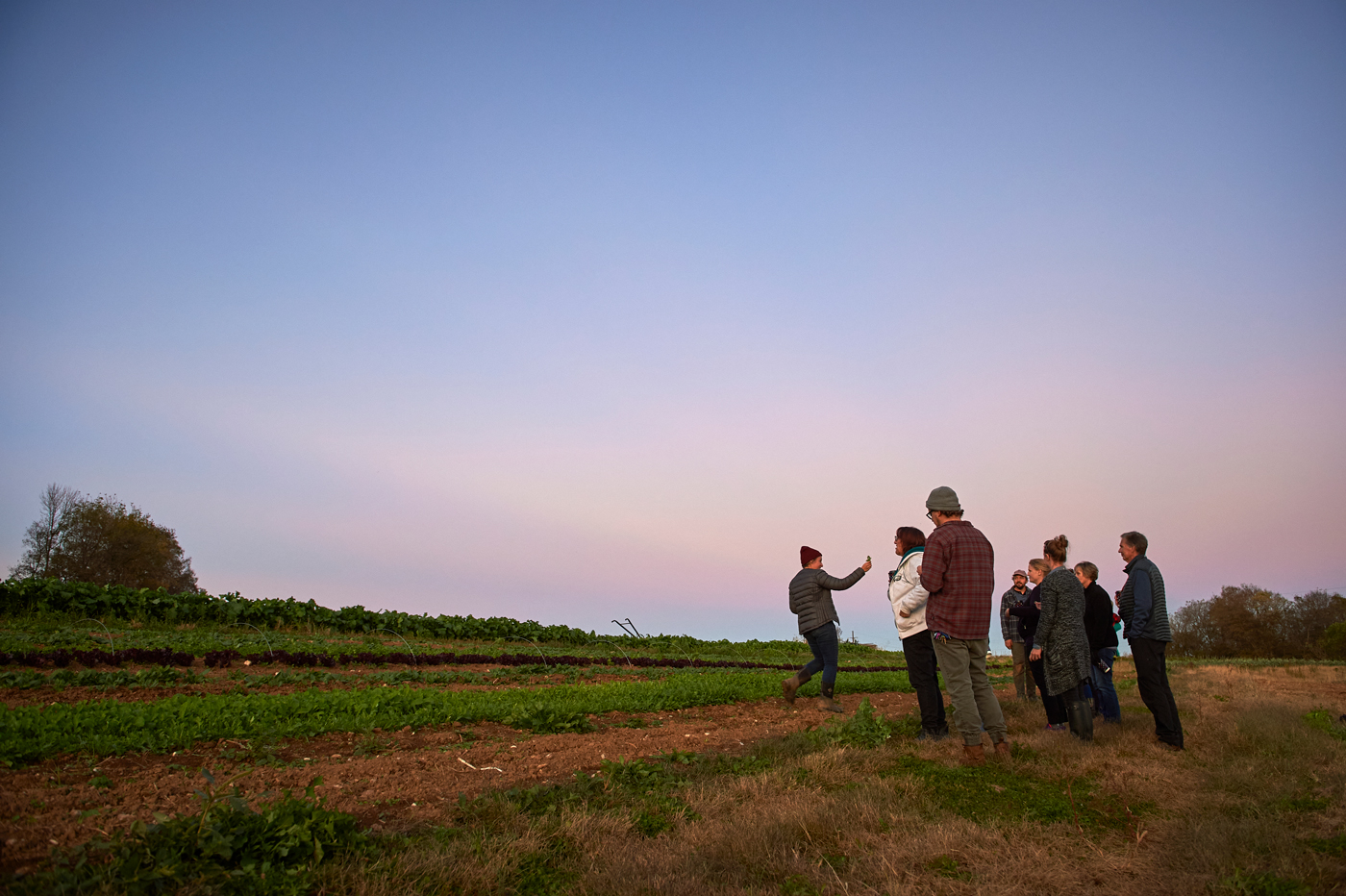
Very cool article Mr. Jordan Bush
Thank you, Mr. Jim Wolfe!